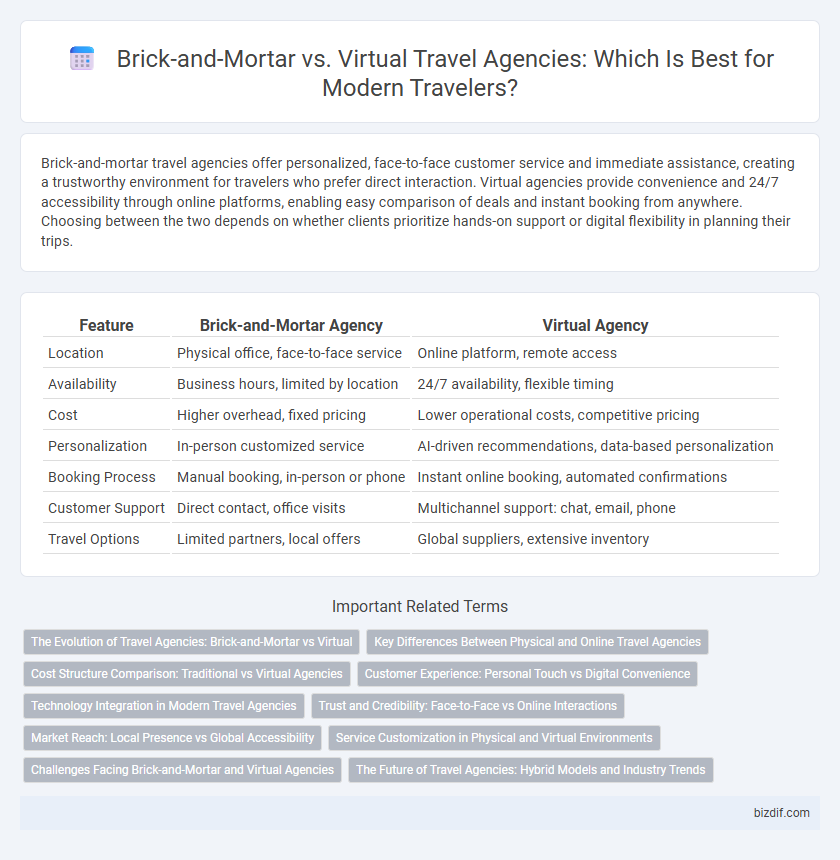Brick-and-mortar travel agencies offer personalized, face-to-face customer service and immediate assistance, creating a trustworthy environment for travelers who prefer direct interaction. Virtual agencies provide convenience and 24/7 accessibility through online platforms, enabling easy comparison of deals and instant booking from anywhere. Choosing between the two depends on whether clients prioritize hands-on support or digital flexibility in planning their trips.
Table of Comparison
| Feature | Brick-and-Mortar Agency | Virtual Agency |
|---|---|---|
| Location | Physical office, face-to-face service | Online platform, remote access |
| Availability | Business hours, limited by location | 24/7 availability, flexible timing |
| Cost | Higher overhead, fixed pricing | Lower operational costs, competitive pricing |
| Personalization | In-person customized service | AI-driven recommendations, data-based personalization |
| Booking Process | Manual booking, in-person or phone | Instant online booking, automated confirmations |
| Customer Support | Direct contact, office visits | Multichannel support: chat, email, phone |
| Travel Options | Limited partners, local offers | Global suppliers, extensive inventory |
The Evolution of Travel Agencies: Brick-and-Mortar vs Virtual
The evolution of travel agencies highlights a dynamic shift from traditional brick-and-mortar establishments, which offer personalized in-person services and local expertise, to virtual agencies driven by advanced technology platforms, providing convenient, 24/7 global access and competitive pricing. Virtual travel agencies utilize artificial intelligence and big data for tailored recommendations, while brick-and-mortar agencies emphasize human interaction and trust built through face-to-face communication. This transformation reflects consumer demand for flexibility, real-time updates, and seamless booking experiences, positioning virtual agencies as industry leaders in digital innovation.
Key Differences Between Physical and Online Travel Agencies
Physical travel agencies offer personalized, face-to-face service with immediate assistance and tangible brochures, while virtual agencies provide 24/7 access, extensive online resources, and competitive pricing through digital platforms. Brick-and-mortar locations often have higher operational costs reflected in service fees, whereas online agencies benefit from lower overhead, enabling streamlined booking processes and instant comparison tools. Customer experience varies as physical agencies build trust through in-person interactions, whereas virtual agencies leverage user reviews and AI-driven recommendations for personalized travel planning.
Cost Structure Comparison: Traditional vs Virtual Agencies
Traditional brick-and-mortar travel agencies incur significant overhead costs, including rent, utilities, and in-store staff salaries, which increase their operational expenses. Virtual travel agencies operate efficiently with lower fixed costs by leveraging digital platforms, minimizing physical infrastructure and personnel expenses. This streamlined cost structure enables virtual agencies to offer more competitive pricing and higher profit margins compared to traditional agencies.
Customer Experience: Personal Touch vs Digital Convenience
Brick-and-mortar travel agencies offer personalized customer experiences through face-to-face interactions, fostering trust and tailored travel planning. Virtual agencies provide digital convenience with 24/7 access, instant booking, and AI-powered recommendations, enhancing efficiency for tech-savvy travelers. Combining human expertise with advanced technology creates a balanced customer experience that meets diverse preferences.
Technology Integration in Modern Travel Agencies
Modern travel agencies leverage advanced technology integration to enhance customer experience, with virtual agencies utilizing AI-driven platforms and mobile apps for seamless booking and personalization. Brick-and-mortar agencies adopt interactive kiosks, VR tours, and CRM systems to provide personalized service while maintaining physical presence. Both models increasingly rely on data analytics and cloud-based solutions to optimize operations and customer engagement.
Trust and Credibility: Face-to-Face vs Online Interactions
Brick-and-mortar travel agencies establish trust through in-person interactions, allowing clients to build credibility via direct communication and personalized service. Virtual agencies rely on digital platforms, leveraging verified customer reviews, secure payment systems, and real-time responsiveness to enhance trust. Both models emphasize transparency and reliability, but face-to-face meetings often create stronger emotional connections, while online agencies provide convenience and access to broader resources.
Market Reach: Local Presence vs Global Accessibility
Brick-and-mortar travel agencies typically maintain a strong local presence, attracting customers through face-to-face interactions and community trust, which is vital for personalized service in specific regions. Virtual travel agencies leverage global accessibility by utilizing online platforms to reach a broader international audience, enabling travelers from various locations to access services seamlessly. The contrast between localized market penetration and expansive digital outreach defines the strategic advantage of each agency type in the competitive travel industry.
Service Customization in Physical and Virtual Environments
Brick-and-mortar travel agencies offer personalized service customization through face-to-face interactions, allowing agents to tailor travel plans based on immediate client feedback and nuanced preferences. Virtual agencies leverage advanced algorithms and AI-driven tools to customize itineraries efficiently, providing real-time updates and recommendations tailored to user behavior and travel history. Both environments prioritize service customization but differ in approach: physical agencies excel in personalized human connection, while virtual platforms maximize data-driven personalization for convenience and speed.
Challenges Facing Brick-and-Mortar and Virtual Agencies
Brick-and-mortar travel agencies face challenges including high operational costs, limited geographic reach, and difficulty adapting to rapidly changing technology and consumer preferences. Virtual agencies struggle with building trust, maintaining personalized customer service, and managing cybersecurity risks amid increasing online competition. Both models must innovate continuously to meet evolving traveler expectations and market dynamics.
The Future of Travel Agencies: Hybrid Models and Industry Trends
Hybrid travel agency models combine the personalized service and local expertise of brick-and-mortar agencies with the convenience and expansive offerings of virtual platforms, shaping the future of the travel industry. Industry trends indicate a growing demand for seamless omnichannel experiences, where travelers can seamlessly transition between online research and in-person consultations. Integrating advanced technologies like AI-powered booking tools and virtual reality tours enhances customer engagement while maintaining the trusted touch of traditional travel advisors.
Brick-and-mortar vs Virtual agency Infographic

 bizdif.com
bizdif.com